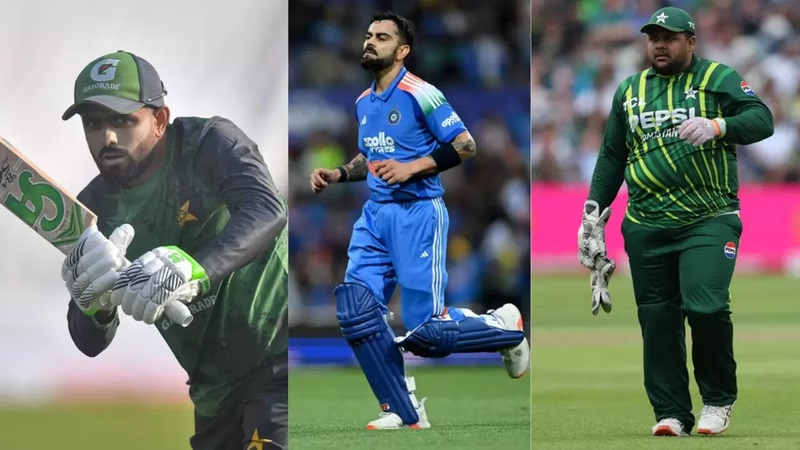The eternal cricketing debate—Kohli vs Babar Azam—has a new voice, and it’s coming from an unexpected corner: Pakistan’s own dressing room. In a candid and surprisingly reflective interview, Pakistan’s dynamic wicketkeeper-batter Azam Khan didn’t just compare the two modern greats—he drew a sharp contrast, emphasizing what he sees as a “huge difference” in their journeys, not in talent, but in ecosystem .
While fans often pit the two captains against each other based on stats or captaincy records, Azam Khan shifted the lens to something deeper: support structures, team culture, and fan perception. His comments, made in the wake of India’s recent T20 series win and Suryakumar Yadav’s remarks on the India-Pakistan “rivalry,” offer a rare insider’s perspective from across the border.
Table of Contents
- Azam Khan on the Kohli vs Babar Azam Difference
- The Support System Gap: Senior Players and Culture
- Do Pakistani Fans Undervalue Babar Azam?
- Agreeing with Suryakumar Yadav on the ‘Rivalry’
- Stats, Context, and Why Comparisons Are Flawed
- The Emotional Weight of Captaining Pakistan
- Conclusion: A Call for Appreciation, Not Comparison
- Sources
Azam Khan on the Kohli vs Babar Azam Difference
“There’s a huge difference!” Azam Khan declared when asked about the often-made comparison between Virat Kohli and Babar Azam . But his point wasn’t about batting averages or centuries—it was about environment.
“Babar elevated Pakistan’s batting reputation globally, just like Kohli did for India,” Khan acknowledged. “But Virat had a strong core around him—Dhoni, Rohit, Rahane—who backed him, guided him, and shared the pressure. Babar? He’s often had to carry the burden alone.”
This observation cuts to the heart of a growing sentiment within Pakistan cricket: that Babar’s individual brilliance has been let down by systemic instability and a lack of consistent senior leadership in the post-Misbah/Younis era.
The Support System Gap: Senior Players and Culture
Khan’s insight highlights a stark contrast in team dynamics:
- India (Kohli era): Stable core of experienced players (Dhoni as mentor, Rohit as vice-captain, Rahane as deputy), clear roles, and a unified team culture fostered over years.
- Pakistan (Babar era): Frequent leadership changes, early retirements of seniors, and a revolving door of middle-order batters left Babar as the lone consistent pillar.
As noted by ESPNcricinfo, Pakistan has cycled through five Test captains since 2019, while India maintained continuity under Kohli and then Rohit. This instability amplifies pressure on any individual star—especially one as central as Babar.
Do Pakistani Fans Undervalue Babar Azam?
Perhaps Azam Khan’s most poignant remark was about fan perception. “I don’t think Pakistani fans fully appreciate what Babar has done for our cricket,” he said .
Despite being Pakistan’s highest run-scorer in ODIs and T20Is, Babar faces intense scrutiny for every failure—often overshadowing his historic achievements, like becoming the fastest to 3,000 ODI runs or leading Pakistan to the 2022 T20 World Cup final.
In contrast, Kohli—while criticized at times—has largely enjoyed unwavering public and institutional support, even during his 1,000-day century drought. The difference, Khan implies, isn’t just about performance—it’s about how a nation treats its icons.
Agreeing with Suryakumar Yadav on the ‘Rivalry’
Azam Khan also weighed in on India captain Suryakumar Yadav’s recent comment that the India-Pakistan “rivalry” is overrated from a player’s perspective—stating he agrees.
“We respect them, we play hard, but it’s not personal,” Khan said. “The real rivalry is with our own standards.” This sentiment reflects a generational shift: younger players on both sides see the hype as media-driven, not match-defining.
Yet, the emotional weight remains—for fans, for boards, and for legacies. Which is why comparisons like Kohli vs Babar Azam persist, even when players themselves wish to move beyond them.
Stats, Context, and Why Comparisons Are Flawed
While fans love head-to-head stats, context matters immensely:
| Metric | Virat Kohli (as of Nov 2025) | Babar Azam (as of Nov 2025) |
|---|---|---|
| ODI Avg | 57.8 | 56.2 |
| T20I Avg | 52.1 | 54.7 |
| Centuries (ODIs) | 50 | 20 |
| Team Win % (as captain) | 63% | 48% |
Kohli’s numbers are bolstered by a more stable team structure and consistent top-order protection. Babar, often batting with a fragile middle order, has had to anchor innings alone—a role that limits scoring rate but increases responsibility.
The Emotional Weight of Captaining Pakistan
Captaining Pakistan comes with unique pressures: political interference, media sensationalism, and fan volatility. Babar stepped down from all captaincy roles in 2024, citing mental fatigue—a decision many now see as necessary self-preservation.
Azam Khan’s comments subtly advocate for empathy. Instead of demanding more from Babar, perhaps it’s time to build a system that supports him—as India did for Kohli.
Conclusion: A Call for Appreciation, Not Comparison
Azam Khan’s take on the Kohli vs Babar Azam debate isn’t about declaring a winner. It’s a plea for context, for understanding, and for recognizing that greatness doesn’t flourish in a vacuum. Babar Azam may not have had the same ecosystem as Kohli—but his achievements, under greater adversity, deserve not just comparison, but celebration. As Khan reminds us: sometimes, the real difference isn’t in the player, but in the world around them.
